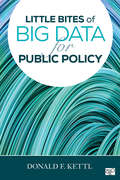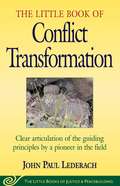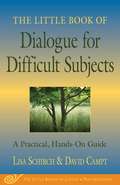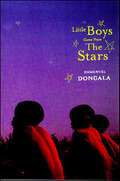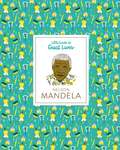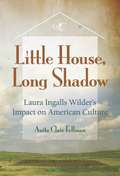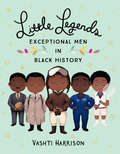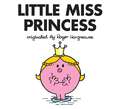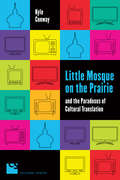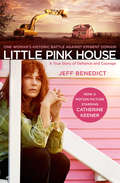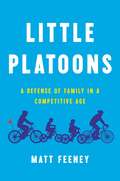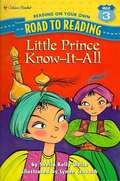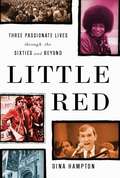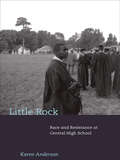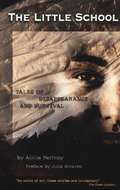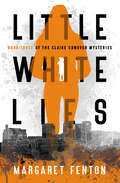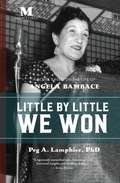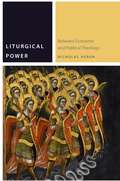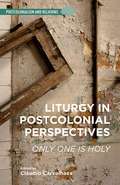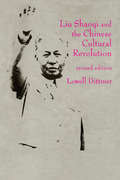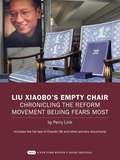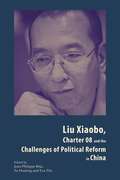- Table View
- List View
Little Bites of Big Data for Public Policy
by Donald F. KettlLittle Bites of Big Data for Public Policy brings to life the quest to make better policy with better evidence. This brief book frames the big puzzles and, through lively stories and clear examples, provides a valuable how-to guide for producing analysis that works—that speaks persuasively to policy makers, in the language they can best hear, on the problems for which they most need answers. Author Donald F. Kettl brings together the cutting-edge streams of data analytics and data visualization to frame the big puzzles and find ways to make the pieces fit together. By taking little bites of a wide variety of useful data, and then by analyzing it in ways that decision makers will find most helpful, analysts can be much more effective in shaping solutions to the most important problems governments face.
Little Bites of Big Data for Public Policy
by Donald F. KettlLittle Bites of Big Data for Public Policy brings to life the quest to make better policy with better evidence. This brief book frames the big puzzles and, through lively stories and clear examples, provides a valuable how-to guide for producing analysis that works—that speaks persuasively to policy makers, in the language they can best hear, on the problems for which they most need answers. Author Donald F. Kettl brings together the cutting-edge streams of data analytics and data visualization to frame the big puzzles and find ways to make the pieces fit together. By taking little bites of a wide variety of useful data, and then by analyzing it in ways that decision makers will find most helpful, analysts can be much more effective in shaping solutions to the most important problems governments face.
Little Book of Conflict Transformation: Clear Articulation Of The Guiding Principles By A Pioneer In The Field
by John LederachThis clearly articulated statement offers a hopeful and workable approach to conflict-that eternally beleaguering human situation.John Paul Lederach is internationally recognized for his breakthrough thinking and action related to conflict on all levels-person-to-person, factions within communities, warring nations. He explores why "conflict transformation" is more appropriate than "conflict resolution" or "management." But he refuses to be drawn into impractical idealism.Conflict Transformation is an idea with a deep reach. Its practice, says Lederach, requires "both solutions and social change." It asks not simply "How do we end something not desired?", but "How do we end something destructive and build something desired?" How do we deal with the immediate crisis, as well as the long-term situation? What disciplines make such thinking and practices possible?A title in The Little Books of Justice and Peacebuilding Series.
Little Book of Dialogue for Difficult Subjects: A Practical, Hands-On Guide
by Lisa SchirchThe word "dialogue" suffers from over-use, yet its practice is as transforming and as freshly hopeful as ever. Authors Schirch and Campt demonstrate dialogue's life and possibilities in this clear and absorbing manual: "Dialogue allows people in conflict to listen to each other, affirm their common ground, and explore their differences in a safe environment." Schirch has worked throughout the Southern hemisphere in peacebuilding projects. Campt has focused on racial and class reconciliation in American cities.
Little Boys Come From The Stars
by Emmanuel DongalaThe peculiar and moving story of a Congolese boy's coming-of-age amid the political strife of postcolonial CongoHis nickname is Matapari, which means "trouble." He is an African child of the '90s--brilliant, mischievous, postcolonial, postmodern-caught in the crossfire of a chaotically liberated African country. Matapari grows up in a world of talking drums, the Internet, and satellite TV, a world of dictators who remake themselves as democrats overnight. His uncle is a stooge for the dictator; his father is a scholarly recluse obsessed with proving that blacks played key roles in Western history. Matapari is a young man in the middle--but the shrewdness and wit with which he tells his often riotously funny story set him apart from his relatives and countrymen. Emmanuel Dongala uses the ingenious viewpoint of a child to show up the telltale world of adults--and to show how one preserves one's independence in a corrupt and violent society.
Little Britain: El brexit y el declive del Reino Unido (Flash Ensayo)
by Eduardo Suárez María Ramírez¿Cómo se explica el brexit? Un breve recorrido sobre las equivocadas pretensiones aislacionistas del Reino Unido? El resultado del brexit y las recientes elecciones parlamentarias son el reflejo de la delicada situación sociopolítica que vive actualmente Reino Unido. La gran tragedia británica no solo conlleva una gran incertidumbre respecto a su futuro sino que manifiesta el choque generacional que existe entre sus votantes. Ameno y esclarecedor, este ensayo busca explicar las causas y los desafíos de otro de los acontecimientos más surrealistas de estos tiempos atribulados.
Little Elizabeth: The Young Princess Who Became Queen
by Valerie WildingThe incredible true story of a young and brilliant Princess who grew up to become our Queen. Once, a very long time ago, there was a little Princess called Elizabeth who loved to play and have fun with her horses, dogs and little sister, Margaret. But when she was ten years old, her life changed forever.From growing up during the Second World War and training as an army mechanic, to celebrating VE day with the people of Britain and marrying Prince Phillip - the man she loved, this is the amazing true story of a little girl who became Queen Elizabeth II.With fantastically fun, charming and playful illustrations by Pauline Reeves, this picture book will amaze and entertain young readers.
Little Guides To Great Lives: Nelson Mandela
by Isabel ThomasAnti-apartheid revolutionary, politician, and philanthropist, Nelson Mandela's journey from political prisoner to president of South Africa is an incredible tale of triumph in the face of adversity. 2018 marks a hundred years since his birth. From artists to aviators and scientists to revolutionaries, Little Guides to Great Lives is a brand new series of small-format guides introducing children to the most inspirational figures from history in a fun, accessible way.
Little House, Long Shadow: Laura Ingalls Wilder's Impact on American Culture
by Anita Clair FellmanBeyond their status as classic children's stories, Laura Ingalls Wilder's Little House books play a significant role in American culture that most people cannot begin to appreciate. Millions of children have sampled the books in school; played out the roles of Laura and Mary; or visited Wilder home sites with their parents, who may be fans themselves. Yet, as Anita Clair Fellman shows, there is even more to this magical series with its clear emotional appeal: a covert political message that made many readers comfortable with the resurgence of conservatism in the Reagan years and beyond. In Little House, Long Shadow, a leading Wilder scholar offers a fresh interpretation of the Little House books that examines how this beloved body of children's literature found its way into many facets of our culture and consciousness-even influencing the responsiveness of Americans to particular political views. Because both Wilder and her daughter, Rose Wilder Lane, opposed the New Deal programs being implemented during the period in which they wrote, their books reflect their use of family history as an argument against the state's protection of individuals from economic uncertainty. Their writing emphasized the isolation of the Ingalls family and the family's resilience in the face of crises and consistently equated self-sufficiency with family ac Fellman argues that the popularity of these books-abetted by Lane's overtly libertarian views-helped lay the groundwork for a negative response to big government and a positive view of political individualism, contributing to the acceptance of contemporary conservatism while perpetuating a mythic West. Beyond tracing the emergence of this influence in the relationship between Wilder and her daughter, Fellman explores the continuing presence of the books-and their message-in modern cultural institutions from classrooms to tourism, newspaper editorials to Internet message boards. Little House, Long Shadow shows how ostensibly apolitical artifacts of popular culture can help explain shifts in political assumptions. It is a pioneering look at the dissemination of books in our culture that expands the discussion of recent political transformations-and suggests that sources other than political rhetoric have contributed to Americans' renewed appreciation of individualist ideals
Little Legends: Exceptional Men In Black History
by Vashti HarrisonNew York Times bestselling author-illustrator Vashti Harrison shines a bold, joyous light on black men through history.An important book for readers of all ages, this beautifully illustrated and engagingly written volume brings to life true stories of black men in history. Among these biographies, readers will find aviators and artists, politicians and pop stars, athletes and activists. The exceptional men featured include artist Aaron Douglas, civil rights leader John Lewis, dancer Alvin Ailey, filmmaker Oscar Micheaux, musician Prince, photographer Gordon Parks, tennis champion Arthur Ashe, and writer James Baldwin.The legends in this book span centuries and continents, but what they have in common is that each one has blazed a trail for generations to come.
Little Miss Princess (Mr. Men and Little Miss)
by Adam HargreavesLittle Miss Princess is true royalty, the daughter of a king and queen, and she's always had servants to take care of her every need. She knows how lucky she is, and one day she decides to try to spread her luck around. But will she be able to help out with things she's never even had to do for herself?
Little Mosque on the Prairie and the Paradoxes of Cultural Translation
by Kyle ConwayIn 2007, Little Mosque on the Prairie premiered on the Canadian Broadcasting Corporation network. It told the story of a mosque community that worshiped in the basement of an Anglican church. It was a bona fide hit, running for six seasons and playing on networks all over the world. Kyle Conway’s textual analysis and in-depth research, including interviews from the show’s creator, executive producers, writers, and CBC executives, reveals the many ways Muslims have and have not been integrated into North American television. Despite a desire to showcase the diversity of Muslims in Canada, the makers of Little Mosque had to erase visible signs of difference in order to reach a broad audience. This paradox of ‘saleable diversity’ challenges conventional ideas about the ways in which sitcoms integrate minorities into the mainstream.
Little Pink House: A True Story of Defiance and Courage
by Jeff BenedictSuzette Kelo was just trying to rebuild her life when she purchased a falling down Victorian house perched on the waterfront in New London, CT. The house wasn't particularly fancy, but with lots of hard work Suzette was able to turn it into a home that was important to her, a home that represented her new found independence. Little did she know that the City of New London, desperate to revive its flailing economy, wanted to raze her house and the others like it that sat along the waterfront in order to win a lucrative Pfizer pharmaceutical contract that would bring new business into the city. Kelo and fourteen neighbors flat out refused to sell, so the city decided to exercise its power of eminent domain to condemn their homes, launching one of the most extraordinary legal cases of our time, a case that ultimately reached the United States Supreme Court. In Little Pink House, award-winning investigative journalist Jeff Benedict takes us behind the scenes of this case -- indeed, Suzette Kelo speaks for the first time about all the details of this inspirational true story as one woman led the charge to take on corporate America to save her home.
Little Platoons: A Defense of Family in a Competitive Age
by Matt FeeneyThis eye-opening book brilliantly explores the true roots of over-parenting, and makes a case for the vital importance of family life.Parents naturally worry about the future. They want to prepare their children to compete in an uncertain world. But often, argues political philosopher and father of three Matt Feeney, today's worried parents surrender their family's autonomy to gain a leg up in this competition.In the American ideal, family life is a sacred and private sphere, distinct from the outside world. But in our hypercompetitive times, Feeney shows, parents have become increasingly willing to let the inner life of the family be colonized by outside forces that promise better futures for their kids: prestigious preschools, "educational" technologies, youth sports leagues, a multitude of enrichment activities, and -- most of all -- college. A provocative, eye-opening book for any parent who suspects their kids' stuffed schedules are not serving their best interests, Little Platoons calls us to rediscover the distinctive, profound solidarity of family life.
Little Prince Know-It-All
by Sheila Kelly WelchTwo popular themes -- pets and sibling rivalry -- come together in this slyly funny story about two little princes who compete to see who has the smarter pet.
Little Red: Three Passionate Lives through the Sixties and Beyond
by Dina HamptonIn the early 1960s, a remarkable crop of students graduated from a small New York City school renowned for progressive pedagogy and left-wing politics: Little Red School House and Elisabeth Irwin High School. These young people entered college at the peak of the transformative era we now call The Sixties, and would go on to impact the course of United States history for the next half century. Among them were Angela Davis, the brilliant, stunning African American Communist and academic who became the face of the Black Power movement; Tom Hurwitz, Students for a Democratic Society (SDS) activist and cinematographer who played a key role in the occupation of Columbia University; and Elliott Abrams, who rebelled against the leftist political orthodoxies of the school and of the times, and ultimately played key roles in the Reagan administration, the George W. Bush administrations and the neoconservative movement.In Little Red, based on extensive original interviews and archival research, Dina Hampton tells the compelling, interwoven life stories of these three schoolmates. Their tumultuous, divergent, public and private paths wind through the seminal events and political conflicts of recent American history, from the civil rights movement to the Vietnam War; the Summer of Love to the feminist uprising; Iran-Contra to Occupy Wall Street. As they pursue political ends, each of their lives will be shaped by events, relationships and social changes they never imagined. Their successes and setbacks will resonate with anyone who has struggled to reconcile the utopian goals of The Sixties-or of youth itself-with the realities of day-to-day life in the world as it is. Today, a new generation is taking to the streets, galvanized by controversial wars and social and economic inequities as troubling as those we faced in the 1960s. The stories of Angela, Tom and Elliott serve as both road map and cautionary tale for anyone engaged in that most American of acts-trying to perfect the world.
Little Rock
by Karen AndersonThe desegregation crisis in Little Rock is a landmark of American history: on September 4, 1957, after the Supreme Court struck down racial segregation in public schools, Arkansas Governor Orval Faubus called up the National Guard to surround Little Rock Central High School, preventing black students from going in. On September 25, 1957, nine black students, escorted by federal troops, gained entrance. With grace and depth, Little Rock provides fresh perspectives on the individuals, especially the activists and policymakers, involved in these dramatic events. Looking at a wide variety of evidence and sources, Karen Anderson examines American racial politics in relation to changes in youth culture, sexuality, gender relations, and economics, and she locates the conflicts of Little Rock within the larger political and historical context. Anderson considers how white groups at the time, including middle class women and the working class, shaped American race and class relations. She documents white women's political mobilizations and, exploring political resentments, sexual fears, and religious affiliations, illuminates the reasons behind segregationists' missteps and blunders. Anderson explains how the business elite in Little Rock retained power in the face of opposition, and identifies the moral failures of business leaders and moderates who sought the appearance of federal compliance rather than actual racial justice, leaving behind a legacy of white flight, poor urban schools, and institutional racism. Probing the conflicts of school desegregation in the mid-century South, Little Rock casts new light on connections between social inequality and the culture wars of modern America.
Little School: Tales of Disappearance and Survival
by Alicia PartnoyOne of Argentina's 30,000 "disappeared," Alicia Partnoy was abducted from her home by secret police and taken to a concentration camp where she was tortured, and where most of the other prisoners were killed. Her writings were smuggled out of prison and published anonymously in human rights journals. The Little School is Alicia Partnoy's memoir of her disappearance and imprisonment in Argentina in the 1970s. Told in a series of tales that resound in memory like parables, The Little School is proof of the resilience of the human spirit and the healing powers of art.This second edition features a revised introduction by the author and a preface by Julia Alvarez.
Little White Lies (Claire Conover Mysteries)
by Margaret FentonA social worker turns amateur sleuth when the child in her care is endangered in this southern domestic thriller. Claire Conover&’s first instinct is always to keep children safe. So when the social worker&’s latest case involves a biracial baby orphaned by what looks like a racially-motivated attack, Claire works night and day to find a family to take in the eight month old. But the only relatives she uncovers could put the baby&’s life into more danger. The case quickly upends her personal life, and the home she is making with her boyfriend, Grant. Things get even more complicated when the teen runaway Claire has been worrying about turns up, brutalized and homeless. Of course, Claire takes her in, even though the move puts her job—and her relationship—at risk. Keeping the children in her care out of harm&’s way is second nature for Claire. But this time, it could cost her everything. Praise for Little Lamb Lost, Book 1 of the Claire Conover Mysteries: &“Fenton puts her experiences as a social worker to good use in her promising debut. . . . With her fine ear for regional speech, Fenton may do for Birmingham what Margaret Maron has done for rural North Carolina.&” —Publishers Weekly &“A relentless social worker makes an intriguing amateur sleuth, and Birmingham offers a fresh take on the New South as a setting for crime fiction. . . . [A] promising new series.&” —Booklist
Little by Little We Won: A Novel Based on the Life of Angela Bambace
by Peg A. LamphierWomen marched for equal pay, the President of the United States advocated an anti-immigration policy, and the income gap between the rich and poor continued to grow. And it was just the beginning of the 20th century. As a girl growing up in Italian Harlem, Angela Bambace needed answers. How could it be acceptable for women not to earn equal pay for equal work? Why were immigrants relegated to the factory jobs no one else would take and working under such dangerous and inhumane conditions? And why were the businessmen at the top getting richer and richer while the poor who worked for them struggled to provide for their own families? How could any of this be okay? But perhaps Angela's most consequential question was If not me, then who? Born to a father and married to a man who both believed a woman's place was in the home, Angela Bambace defied her family and social expectations to lead a labor union--organizing women's marches, strikes, and protests "to build a better world, a better place for everybody." Today, Angela's story might be more significant than ever as others continue her fight and call to action.
Liturgical Power: Between Economic and Political Theology (Commonalities)
by Nicholas HeronIs Christianity exclusively a religious phenomenon, which must separate itself from all things political, or do its concepts actually underpin secular politics? To this question, which animated the twentieth-century debate on political theology, Liturgical Power advances a third alternative. Christian anti-politics, Heron contends, entails its own distinct conception of politics. Yet this politics, he argues, assumes the form of what today we call “administration,” but which the ancients termed “economics.” The book’s principal aim is thus genealogical: it seeks to understand our current conception of government in light of an important but rarely acknowledged transformation in the idea of politics brought about by Christianity.This transformation in the idea of politics precipitates in turn a concurrent shift in the organization of power; an organization whose determining principle, Heron contends, is liturgy—understood in the broad sense as “public service.” Whereas until now only liturgy’s acclamatory dimension has made the concept available for political theory, Heron positions it more broadly as a technique of governance. What Christianity has bequeathed to political thought and forms, he argues, is thus a paradoxical technology of power that is grounded uniquely in service.
Liturgy in Postcolonial Perspectives
by Cláudio CarvalhaesThis book brings Christian, Jewish and Muslim scholars from different fields of knowledge and many places across the globe to introduce/expand the dialogue between the field of liturgy and postcolonial/decolonial thinking. Connecting main themes in both fields, this book shows what is at stake in this dialectical scholarship.
Liu Shaoqi and the Chinese Cultural Revolution
by Lowell DittmerBy addressing the issues that decimated China's monolithic elite in the late 1960s, this text illuminates not only the life and fate of Liu Shaoqi, but also the policy-making process of a revolutionary state facing the diverting exigencies of economic modernization and political development.
Liu Xiaobo's Empty Chair: Chronicling the Reform Movement Beijing Fears Most; Includes the full text of Charter 08 and other primary documents
by Perry LinkWhen the Norwegian Nobel Committee announced it was awarding the 2010 Nobel Peace Prize to the Chinese literary critic and human rights activist Liu Xiaobo, it made special note of his role in writing a remarkable political manifesto called Charter 08. In China, that same document has caused officials to throw him in jail with an 11-year sentence that is extraordinary even by Chinese standards, while taking drastic measures to silence any mention of the text. But what is Charter 08 and why has it made Liu such a threat to the Chinese government? Perry Link, a Professor of Chinese literature who has worked closely with the Chinese dissidents who wrote the charter with Liu, for the first time brings together a full English translation of this powerful document and an incisive new profile of Liu himself with a series of short essays chronicling his arrest, show-trial, and imprisonment and the crackdown on the Charter 08 movement since its courageous beginnings two years ago. In an epilogue, Link draws on leaked government documents to reveal Beijing's nervous response to the Arab uprisings in the spring of 2011.
Liu Xiaobo, Charter 08 and the Challenges of Political Reform in China
by Jean-Philippe BejaIn December 2008 some 350 Chinese intellectuals published a manifesto calling for reform of the Chinese constitution and an end to one-party rule. Known as 'Charter 08,' the manifesto has since been signed by more than 10,000 people. One of its authors, Liu Xiaobo, was awarded the Nobel Peace Prize in 2010 but has remained in prison since 2009 for subversive crimes. This collection of essays - the first of its kind in English - examines the trial of Liu Xiaobo, the significance and impact of Charter 08, and the prospects for reform in China. The essays include contributions from legal and political experts from around the world, an account of Liu's trial by his defence lawyers, and a passionate - and ultimately optimistic - account of resistance, repression and political change by the human rights lawyer Teng Biao.
